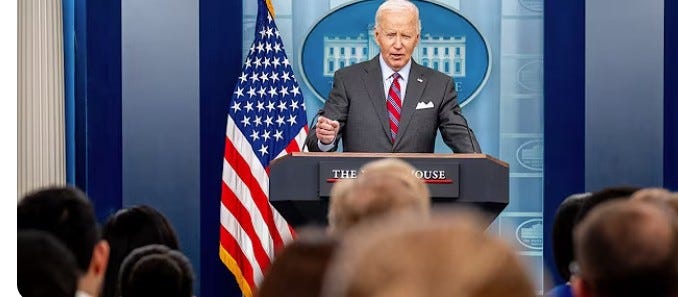Why I’m less worried about a third-party spoiler
With general election trial heat polls extremely tight, many Democrats are understandably nervous about the slew of announced and potential third-party candidacies splitting the anti-MAGA vote and helping Donald Trump win the presidency without popular vote majorities.
But I’m increasingly less worried about the spoiler scenario.
I’ll explain why, but first, here’s what’s leading the Washington Monthly website:
***
***
Recent news indicates that the newest third-party efforts, which still have to navigate a daunting 50-state ballot access obstacle course, are floundering.
So far, No Labels has met requirements for ballot access in 14 states. For independent Robert F. Kennedy, Jr., just Utah and New Hampshire. For independent Cornel West, Alaska and Oregon.
Regarding the third-party veterans, the Green Party is currently on the ballot in 19 states. The Libertarian Party has not yet posted a ballot access tally on its website.
How does that compare to 2020?
Back in April of that election season, I wrote a Politico article about securing ballot access in the pandemic. At that point, the Greens were at 22 and the Libertarians 35. The Greens ended up at 30 (29 for its nominee Howie Hawkins while Alaska’s state party went with Jesse Ventura), far below the 44 states Jill Stein got in 2016. The well-organized Libertarians were on all 50, for the second presidential election in a row.
So there’s still time, but it’s not easy, and even long-running third-party organizations can struggle.
What we’re learning about the No Labels, Kennedy, and West operations doesn’t suggest any of them are firing on all cylinders.
Fourth quarter 2023 campaign finance reports were due yesterday, but there’s no sign of West’s on the Federal Election Commission website. His third quarter report was pathetic: a mere $105,000 in the bank. That’s not enough to buy an average house, let alone run a presidential camapign.
Kennedy is raising real money, but he’s burning through it, without much to show for it in ballot access. He raised $7 million in the last quarter, while spending $7.7 million, and has $5.4 million in the bank. An affiliated super PAC has about $15 million in the bank.
How raggedy is Kennedy’s ballot access operation? Yesterday, North Carolina’s CBS affiliate interviewed Kennedy and told him he needed 83,000 signatures to get on the state’s ballot, which confused the candidate. An off-camera aide said, incorrectly, he needed a little over 13,000. Hours later, the campaign conceded that the report was right.
Now Kennedy appears to be concerned enough about ballot access as an independent that he told CNN’s Michael Smerconish on Saturday that “we are talking to the Libertarian Party” about pursuing its nomination.
Kennedy would have to win that prize at the Libertarian convention, which is no sure thing. (Do yourself a favor and watch Samantha Bee’s report from the 2016 Libertarian Party convention.)
But even if he did, and got on all 50 states as a result, then Kennedy would be even more firmly on the far-right edge of the political spectrum. That would make him less attractive to anyone on the left flirting with an abandonment of Joe Biden.
No Labels also appears to be in a shambolic state.
CNN’s Edward-Isaac Dovere, in the course of reporting the possibility of a presidential bid by Joe Manchin through the centrist No Labels operation, wrote this on Sunday:
The [No Labels] group has set a mid-March deadline to decide whether to back a presidential “unity ticket,” but with about a month and half to go and amid internal turmoil, multiple top No Labels leaders tell CNN they remain in the dark about the path forward…
…Plans for a convention in Dallas have collapsed. Talk of a virtual convention remains ambiguous. Who would be picked as delegates to that convention is a mystery. Who would pick those delegates hasn’t been decided.
Dovere also reported that potential candidate former Maryland Governor Larry Hogan quit No Labels because, in the words of an anonymous Hogan associate, “It’s been far less organized than he expected it to be [and] he doesn’t see a plan coming together.”
There’s no exact number of state ballots required to attract media coverage and warrant inclusion in national polling, but recent history suggests that below 40 states doesn’t cut it. (For the best Green Party showings, Ralph Nader in 2000 was on 43 states, and Stein in 2016 was on 44.)
So while we can’t say for certain yet that no left or centrist third-party operation will fail to get on at least 40 state ballots, the early signs don’t look good for them. And that means lower odds of a spoiled election.
FIND THE MONTHLY ON SOCIAL
We’re on Twitter @monthly
We’re on Threads @WAMonthly
We’re on Instagram @WAMonthly
We’re on Facebook @WashingtonMonthly
Best,
Bill











